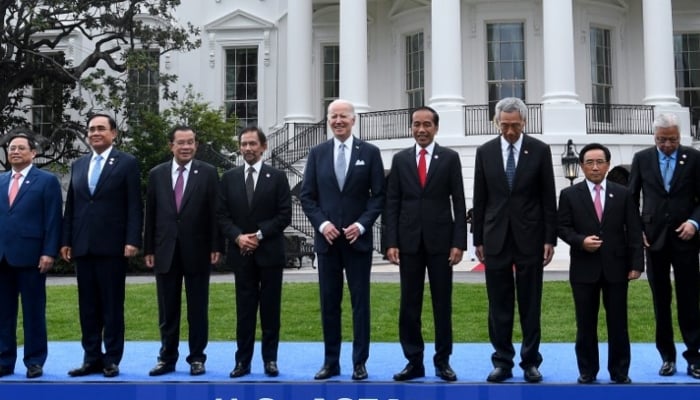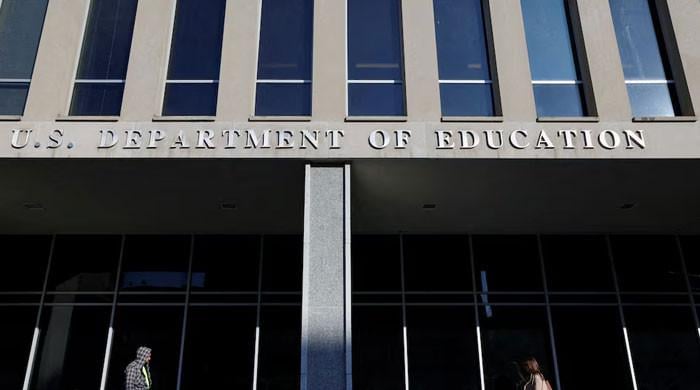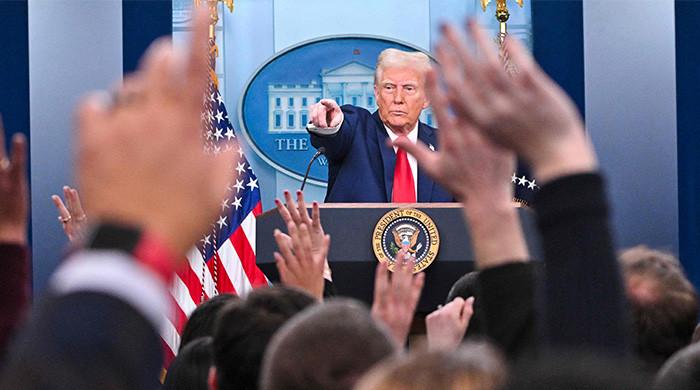Two years of US Indo-Pacific strategy
Due to historic association with Washington and Beijing, Islamabad has potential to promote cooperation over competition
March 11, 2024

US Indo-Pacific Strategy (IPS), launched by President Joe Biden's administration in February 2022, is fast pacing to cross a toddler’s age.
In these two years, IPS has offered a range of opportunities for the member countries. At the same time, eyebrows are raised by China and some other countries that view this as an encirclement of the region.
Pakistan — a long-term US ally — is not an official partner in this framework. Yet, due to its historic association with Washington and Beijing, Islamabad has the potential to promote cooperation over competition.
This fact was apparently recognised by US major general (retd) Suzanne Vares-Lum who visited Pakistan early this month. Since January 2022, she is serving as the president of the East-West Center, an institution established by the United States Congress in 1960s.
It is worth mentioning that, since the establishment of this center, a number of Pakistanis have participated in the EWC programmes. Yet, it was the first visit of any president of this institution to Pakistan.
It is probably because Vares-Lum had earlier advised the highest-ranking officials at the US Indo-Pacific Command in this regard.
Hence, the trip was part of her "mission to promote understanding and relationship among people and nations of the United States, Asia and Pacific through cooperative study, research and dialogue".
Addressing a gathering of EWC alumni in Karachi, Vares-Lum said, "The Indian Ocean and the Pacific Ocean are like two arms hugging the rest of the continents."
Spreading her arms and making a circle, she further said, “And who is on this tip over here, it’s Pakistan and you got Hawaii over here hugging each other”.
Emphasising cooperation, Ms Lum remarked, “If we think about it that way, it makes total sense that we would come here and hug the rest of the region”.
Similar views were earlier expressed by US Assistant Secretary for South and Central Asian Affairs Donald Lu.
Marking two years of Indo-Pacific strategy, Lu clarified that, “The president’s strategy is not aimed at any particular country or group of countries. It’s an affirmative vision about America’s engagement with its allies and partners across this strategically important region”.
It won’t be wrong to say that Vares-Lum and Lu's statements are an extension of the "Indo-Pacific" idea floated first by the late prime minister of Japan Shinzo Abe in India.
While addressing the Indian parliament in August 2007, former prime minister of Japan Shinzo Abe had said, “Now, as this new ‘broader Asia’ takes shape at the confluence of the two seas of the Indian and Pacific Ocean, I feel that the democratic nations located at opposite edges of these seas must deepen the friendship among their citizens at every possible level.”
Biden administration has added both economic and security dimensions to this framework. At the same time, India has been given a pivotal role in this region.
No surprise that China views this strategy as a means to dominate and dictate the region. After all, significant nations of the Pacific region have become force multiplier with most nations of the Indian Ocean.
Wang Yi, the Foreign Minister of China, claims that Washington is devising tactics to suppress Beijing.
Addressing a press conference on diplomacy, Wang Yi said, “If it (Washington) only wants itself to prosper but denies other countries’ legitimate development, where is international fairness? If it persistently monopolises the high end of the value chain and keeps China at the low end, where is fairness in competition?”
Yi also warned Washington of “reaching bewildering levels of unfathomable absurdity”. He said, “The challenge for the US comes from itself, not from China. If the US is obsessed with suppressing China, it will eventually harm itself.”
These simmering tensions have alarmed Pakistan as it cannot afford a possible US-China conflict.
Pakistan’s former caretaker minister for foreign affairs Jalil Abbas Jilani openly addressed this issue during his engagements at the ‘Third EU Indo-Pacific Ministerial Forum’ in Brussels.
Jilani called for “opposing divisive geopolitical contestation that could further aggravate global and regional tensions.”
He stressed that “restrictions on trade and investment, and new forms of protectionism were antithesis to the objectives of shared prosperity, sustainability, and inclusivity”.
In a nutshell, up till now, the Indo-Pacific Strategy has served as an aligning force as well as a reason to alarm those who are not included in this framework.
Making it more inclusive and addressing concerns of the regional nations can surely achieve the stated goals of this strategy. The reason is optimism has not taken over pessimist ideology.
As Wang Yi said, “We hope that it (USA) will work with China to bring the relationship back on the track of stable, sound and sustainable development.”
And according to, Suzanne Vares-Lum hugging the Indo-Pacific nations from both corners of the region is a way to prosperity.











